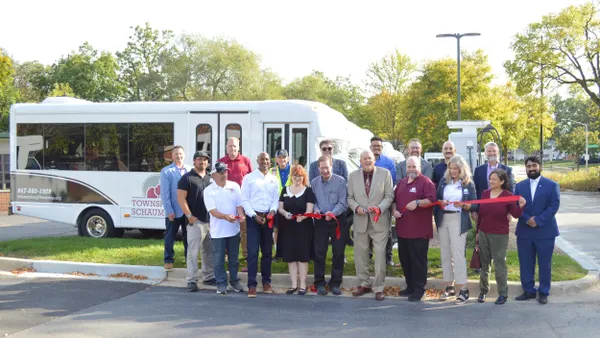Dive Brief:
- For transit agencies to integrate mobility-as-a-service (MaaS), they must play a leading role in decision-making and not leave it all to the private sector, according to a report published last week by transportation management platform Populus.
- The report says public sector agencies should make use of data standards and take advantage of existing, interoperable MaaS platforms rather than invest in building their own, as that option is less costly. Populus also said MaaS must better integrate mobile payment technology so it becomes travelers’ preferred option, and cities should ensure they have ample data around curb and streets use so they can better understand how to manage the space.
- If successful, MaaS can help cities deliver on their congestion and emissions reduction goals while promoting equitable access to transportation, the report says. As well as making it easier for residents to get around, Populus said cities' investments in MaaS can help manage micromobility permits, curb and road pricing, parking and other areas.
Dive Insight:
The growth of MaaS has been heralded as one of the keys for cities to take advantage of the new mobility landscape. In a report last month, Lux Research said MaaS will help cities manage growth in areas like ride-hailing, micromobility and car-sharing, and offering these modes in a seamless platform will also be important for widespread adoption.
In previous years, some experts have raised concerns that the rollout of MaaS platforms have been too slow, especially if individual transit agencies or cities try to build their own homegrown solutions. But as various companies like the Transit app and Masabi, as well as others like Lime, have developed their own MaaS technology, Populus CEO and co-founder Regina Clewlow said cities are more inclined to take advantage of innovations being pioneered by private companies.
"What we've seen is an evolution towards more of an open ecosystem approach, where a lot of cities are saying, 'Look, we don't have the technical infrastructure or financing to build and maintain a custom application, so we'll endorse one of the existing apps that exist, because we fundamentally just want all of these pieces to fit seamlessly into one another,'" Clewlow said.
And it appears private companies are looking to get in on the action. Uber late last month unveiled a thought paper proposing the foundation of a "new model of public transportation" to evolve in U.S. cities over the coming decade, replacing public transit systems with integrated, technology-driven multi-modal networks.
Transit agencies and MaaS providers have been exploring new ways to process payments, primarily through mobile ticketing and utilizing new technology like Apple Pay. But Clewlow noted that while agencies are often locked into long-term contracts with vendors that process payments, there is more experimentation afoot and companies are looking for new ways to sell tickets.
"We do see some agencies that are being a bit more innovative or having a bit more flexibility, perhaps in their existing contracts," Clewlow said. "What's also nice is that we're seeing vendors that are recognizing that an open ecosystem and interoperable approach is probably going to be better for them in the long run in terms of winning more business. And so they're not trying to lock payments into basically one funnel, or one app."
As cities look to embrace MaaS technology, Populus’ report said they will need to prioritize management of their curb space and other physical infrastructure and have data on how that infrastructure is used. In an earlier report, Transportation for America said cities should take the lead on curb management rather than leave it to private vendors, and Populus reached a similar conclusion.
"In order for cities to communicate how their streets and curbs should be used, that information about their streets and curbs actually has to exist in some digital form and it often doesn’t," Clewlow said. "So you're going to have to invest in that and also we need to make sure they understand the ownership rights of that data, so they can't sell the rights to their digital physical infrastructure away to a private company like Google."












